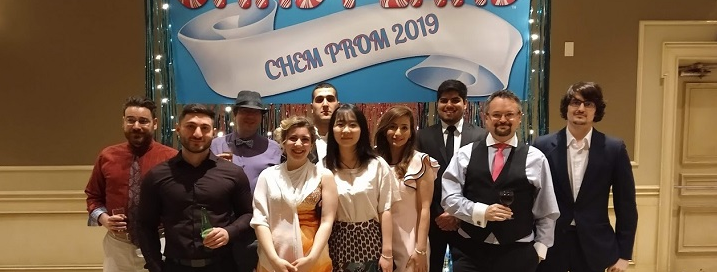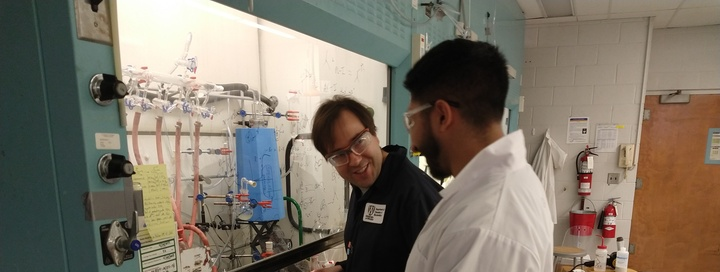I am currently accepting applications for the following positions. Female and sexual minority students are especially encouraged to apply.
We have now closed applications from outside North America for Fall 2025. North American-based applicants may still submit through March 2025. An exception will be made for candidates with extensive molecular modelling experience who are looking to pursue a PhD in the field, or for a peptide chemist with SOME previous experience ; we will also continue to support scholars at risk leaving warzones with positions available year round as needed. Canadian citizens and permanent residents are especially encouraged to apply. Applications for Fall 2026 will open in November 2025-February 2026.
I am also currently looking for new first year (class of 2030) undergrad volunteers or Outstanding Scholars!

I am no longer considering applicants for Fall 2025 or January 2026. Exceptions are possible for those with experience and interest in computational chemistry, or computational structural biology, or for those leaving warzones.
If you are interested for Fall 2026, please submit your application between November 2025-March 2026 when we will reopen consideration of applicants.
Candidates can be interested in synthetic or computational chemistry with some demonstrable experience in either field required. A publication record is not required. Special encouragement is given for those with non-traditional backgrounds. I am not currently accepting graduate students in molecular or microbiology or biomedical engineering.
Note: I do not accept students whose primary experience and background is nanoparticle synthesis, this is generally not synthetic chemistry.

If you are interested, please submit your resumé/CV and a copy (a screenshot is fine, official is definitely not required) of your high school or university transcript. At this time, we are only considering FIRST year students to join the group
I had to put this up, link to it from my website, and try to help people looking for a position.
As the lab group is getting established and as we are building a limited reputation (and as the USA continues to make it increasingly challenging for talented students to pursue studies there) I am receiving a lot more applications for grad school and post doc positions. Generally I get three or four a day. As I take, at absolute most, 3 or 4 grad students a year and a similar number of new PDFs the odds are not in the favour of the applicants. This is definitely not unique to me and is pretty common for almost any prof at a research university. But I want to speak from my experience as it might be slightly different from others: it is harder for me to tell if a student is serious or not becasue of the breadth of the research program. I need computational and synthetic chemists. I need biologists. I need engineers. I probably will need entirely different skills in my group in the future. So it isn’t immeidately obvious if someone is “in-field” or not. But I share the same sentiment common among my colleagues: I only want team members who are excited to be here working with me and excited to be on my program. Those letters stand out. They get me interested. They make up for weaker CVs. This is because I was that student too. I had no pubs from my undergrad when I applied for my PhD (though I stayed at my home institution with a supervisor who knew me). When I applied for PDFs I had a weak publication record, far weaker than almost all the applicants to my group. I don’t expect a slew of CNS, JACS and ACIE articles. That tells me more about who you worked for than what you did. And I don’t care who you worked for. I care what you can do with me.
So, I don’t expect an incoming PhD student to have a background in synthetic carbohydrate chem (though that would be awesome) or to be an all star computational chemist with Schrodinger (ditto). But I do expect them to be super interested in becoming those things. I can’t teach passion. I can’t teach drive. Everything else, you can learn. So I want to see that the applicant really seems excited about what we do! We sure are. What does this mean? It doesn’t mean dropping the title of a recent paper in a different font mid-way through the email. I know you didn’t read it. Normally cause if you did, and you saw anything else we did, you would realize that it isn’t our core focus. Especially as nothing else in the email seems geared towards my group. If you want to work with me, then something grabbed your interest. Something we did, several things probably, got you interested. Write about that. “But that takes time!” you say. “The response rate is so low I need to send out tons of these!” I would argue the response rate is so low BECAUSE you are sending out a ton of letters. Each the same as the other: and the Dear Professor [No Name] ones are particularly damning. If I don’t see my name I don’t read it. That was wasted time looking me up. And I am not the only one doing that. It might surprise the applicant, but most professors are not idiots. We see through this. And we get so many applications we can be choosy about who we respond to. Showing interest in us helps.
We have been doing this a whole lot longer than you have been writing letters. And I am really junior. My colleagues have been doing this a LOT longer.
Send out fewer customized letters. After all, you are looking to spend 4-6 years with a prof working with them. That is a huge commitment! Make sure you want to work with them before you reach out. And then, when you do, your letter will stand out among the dozens we receive weekly. And you have a much better chance of actually coming over and doing research with us!
I look forward to hearing why you want to work with the awesome team of scientists I have the honour to lead.
Hi
I do not currently have dedicated funding to support additional international students at this time.
All funds are in Canadian dollars. There are no scholarships offered in Canada, beyond those listed in the letter, for international applicants. The funding could come from scholarships from your home country (which I will be happy to support should you be our candidate) or from personal funds. Canada does not subsidize international students; Canada makes it explicit policy that we aim to recoup costs from international students.
Tuition and fees at the University of Windsor for graduate work are about $28,000/year. Renting a room in a house with roommates is between $600-900/month. 1-bedroom apartments are around $1400/month but are getting harder to get in the city because of how many students are coming to the University from overseas (especially India-Pakistan, China, and West Africa, with strong numbers from Iran and the Arab nations). I anticipate you needing $25,000 in annual living expenses, but probably more to live comfortably. I would factor in an additional 1-time $5,000 for getting settled (clothing, linens, computer, small furniture, although we have a furniture bank here in Windsor to help with people coming to Canada). So, all told you need about $53,000/year. A PhD is 4-5 years.
Income comes from two sources. You will get a teaching assistantship where you will spend 10 hours a week, September-April, working with undergrad students in their labs or courses. This will provide $12,000/year. Our standard research stipend for all students is $11,600. I will pay you MY standard research stipend of $15,000/year. This is the same amount paid to a Canadian student. Finally, if you have an average of over 80% coming in, you will be considered for a $7,500/year scholarship. This totals a remuneration of $32,500 if you have the scholarship. The scholarships were very competitive in 2021. They used to be automatic. They weren’t this year. I don’t know how that speaks to future years.
The difference between Canadian and International students is the tuition. The province of Ontario gives the University $20,000 for every Canadian citizen or permanent resident. It gives nothing for international students. Canadians pay about $8,000/year for University. As a non-Canadian you must cover the entire cost.
Alternatively, you may be awarded an international domestic tuition scholarship. This replaces the entrance scholarship and is valued at the difference between domestic and international tuition. This has an effective value of $20,000/year and is awarded for 4 years. I can generally receive one or two of these per year.
So, doing some real simple math, you need $28,000/year (without scholarship) or $20,000 (with entrance scholarship), or $8,000/year (with international domestic scholarship) of funds from savings or family. It is not possible to get a second job while here. You will be working 50-70 hours/week on your PhD. If you are doing something on top of that, you will be useless to me as you will be so exhausted.
This means that over the 4-5 year span, you will need to spend up to $24,000-80,000-$140,000 of your own or family money. This is a lot. A PhD in Canada does not guarantee a job, nor does it guarantee permanent residency (although to qualify at that point, you simply need a job for 1 year which is normally pretty easy to obtain if you are willing to move around the country). Average incomes for PhD scientists directly out of their degree are around $50-70,000. So family debt would not be insurmountable, but I would strongly advise against external debt-funded studies as there are no guarantees of the job afterwards.
Again, the numbers I quoted are for really bare-bones living. It wouldn’t be fun. To be comfortable, I would add an additional $5-6,000/year to cover little luxuries and eat whatever you want. PhDs are really hard, and if your life is uncomfortable, I can’t imagine getting through one in good mental health.
If you have a spouse, they are generally issued an open work permit at the border on arrival and can work doing anything. This can solve a lot of problems and generally makes this sustainable. They can also gain permanent residency more quickly which would make you a permanent resident as well (it is difficult to gain while pursuing your degree, although not impossible).
If your financial resources can support you through this, and you are still interested, then please send on your CV and transcripts to me, along with reference letters directly from your former research supervisors speaking to your present ability, and potential for research success with an emphasis on concrete examples of the types of research problems that you have solved.
Best wishes,
John
